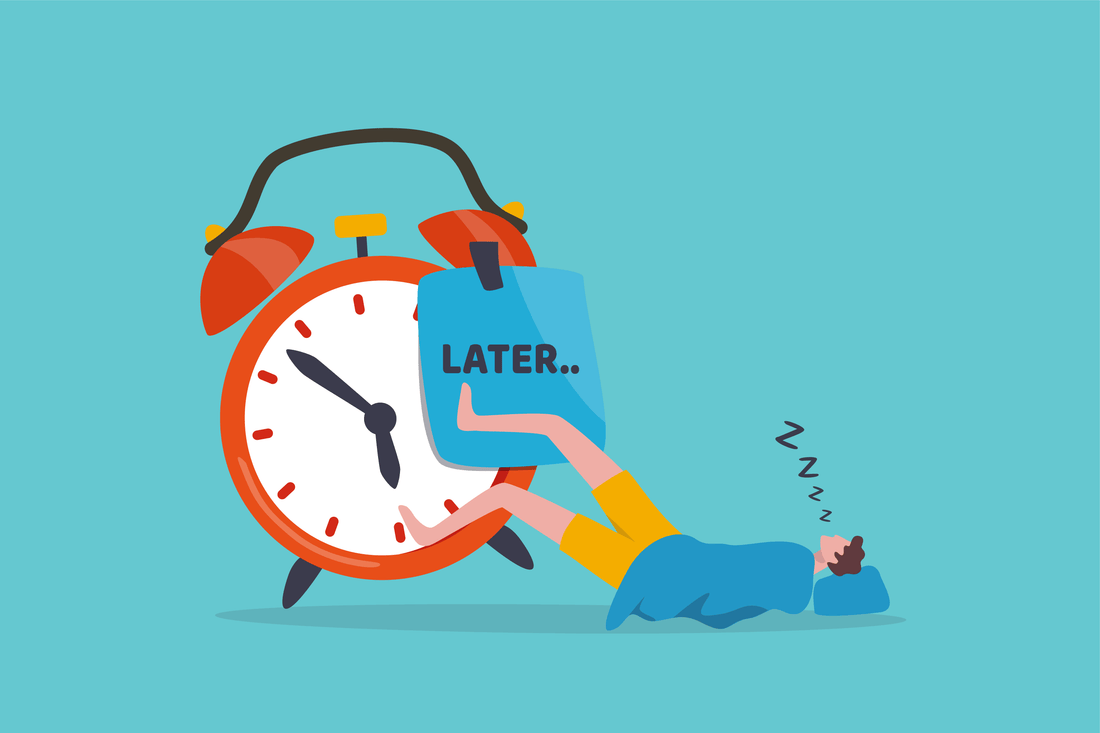We’ve all been there — staring at a blinking cursor, scrolling for “just five more minutes,” or promising ourselves we’ll start after lunch… or after coffee… or after literally anything else. Procrastination isn’t just laziness — it’s a deeply human, often emotionally driven behaviour.
Why we Procrastinate
At its core, procrastination is emotion regulation — not time mismanagement. We delay tasks that trigger negative emotions like fear, boredom, or overwhelm. Our brain's amygdala flares up when a task feels threatening (like one that could lead to failure or judgment), causing us to seek safety in distractions.
Meanwhile, our prefrontal cortex — responsible for long-term planning and impulse control — struggles to hold the line, especially when we're tired or stressed. It's no wonder we reach for the remote instead of the spreadsheet.
Tools to Beat Procrastination
Let’s turn insight into action with a few practical tools:
1. Micro-Goals: Shrink the Task
Overwhelm is a motivation killer. Break big goals into the tiniest steps possible. Instead of “Write the report,” try:
-
Open the doc
-
Write one sentence
-
Create a rough outline
Progress builds momentum.
2. The Pomodoro Technique: Focus in Bursts
Set a timer for 25 minutes of deep work, followed by a 5-minute break. After four rounds, take a longer rest. It’s a brain-friendly way to fight fatigue and focus fast.
3. Mental Reframing: Shift Your Story
-
“Done is better than perfect”
-
“I only have to start, not finish”
-
“This task doesn’t define me — it’s just one step”
4. The 5-4-3-2-1 Method: Bypass Overthinking
When fear or resistance strikes, count down from 5 and take immediate action.
This technique, made popular by Mel Robbins, helps interrupt hesitation and push past the mental block.
It’s especially helpful for Worriers — you don’t have to feel ready, you just have to start.
Change the way you think about the task to change the way you feel about it.
Behaviour Hacks That Work
-
Temptation Bundling: Pair a dreaded task with a reward (e.g., only watch your favourite show while folding laundry).
-
Body Doubling: Work alongside someone else, virtually or in person, to stay on task.
-
Implementation Intentions: Create “If–Then” plans like If I feel distracted, then I’ll set a 2-minute timer to just start.
Know Your Procrastination Style
1.Perfectionists delay starting because they feel everything has to be “just right.” They fear making mistakes and often find it easier to delay tasks rather than risk doing something imperfectly. The fear of producing imperfect work leads to delays, as they worry that anything less than perfect isn’t good enough.
Mindset shift: “Done is better than perfect.”
Actionable Tip: Set a timer for 20 minutes and commit to creating a rough first draft. Resist the urge to polish—just begin.
Focus on making progress, not achieving perfection.
2. Dreamers love coming up with big ideas and possibilities but struggle with taking action. They get stuck in “someday” thinking instead of breaking down their grand visions into actionable steps. They focus on the excitement of the idea but often fail to turn it into concrete plans or actions.
Mindset shift: “Vision without action is just a wish.”
Actionable Tip: Break down big goals into smaller, manageable micro-goals. Write down the first small step you can take today, and make sure you take it.
3. Worriers avoid starting tasks due to anxiety and fear of failure or judgment. They tend to second-guess themselves and become paralysed by the “what-ifs” of the situation. The fear of things going wrong or facing criticism keeps them from taking action, as they prefer to stay in a state of safety.
Mindset shift: “You don’t have to feel ready to begin.”
Actionable Tip: Use the 5-4-3-2-1 method: count down from 5 and take one small action before fear can take hold. Starting is often the hardest part, and once you do, momentum will build.
4. Crisis Makers thrive under pressure and often wait until the last minute to start work. They believe they do their best work when facing a looming deadline. They rely on adrenaline to fuel their productivity, but this can lead to unnecessary stress, burnout, and regret.
Mindset shift: “I can create urgency without the chaos.”
Actionable Tip: Set an early, “fake” deadline for yourself, and use the Pomodoro technique to simulate the pressure of a deadline. Work in short, focused bursts to avoid panic and burnout.
5. Defiers resist doing tasks that feel like they’re being forced upon them. They rebel against authority, whether it's a boss, a deadline, or their own internal expectations. They avoid tasks because they see them as obligations and resist anything that feels like they’re being controlled.
Mindset shift: “This isn’t about giving in, it’s about stepping up for myself.”
Actionable Tip: Reframe tasks as choices rather than obligations. Instead of saying “I have to,” say “I choose to” and connect the task to a larger personal goal or value.
6. Overdoers say “yes” to everything and often end up with a to-do list that’s overwhelming. They struggle to prioritise and end up stuck, unable to start any task at all. Their desire to please others and take on too much leads to exhaustion and a lack of focus. They feel overwhelmed by the sheer volume of tasks they’ve committed to.
Mindset shift: “Doing less is not failure, it’s strategy.”
Actionable Tip: Prioritise the most important task for the day. Focus on completing just one high-impact task before moving on to the next.
Understanding your pattern helps you target the solution.
Procrastination is a habit — and like any habit, it can be changed. This week isn’t about perfection. It’s about progress, perspective, and starting when it’s hard. Because often, the hardest part… is simply beginning.

